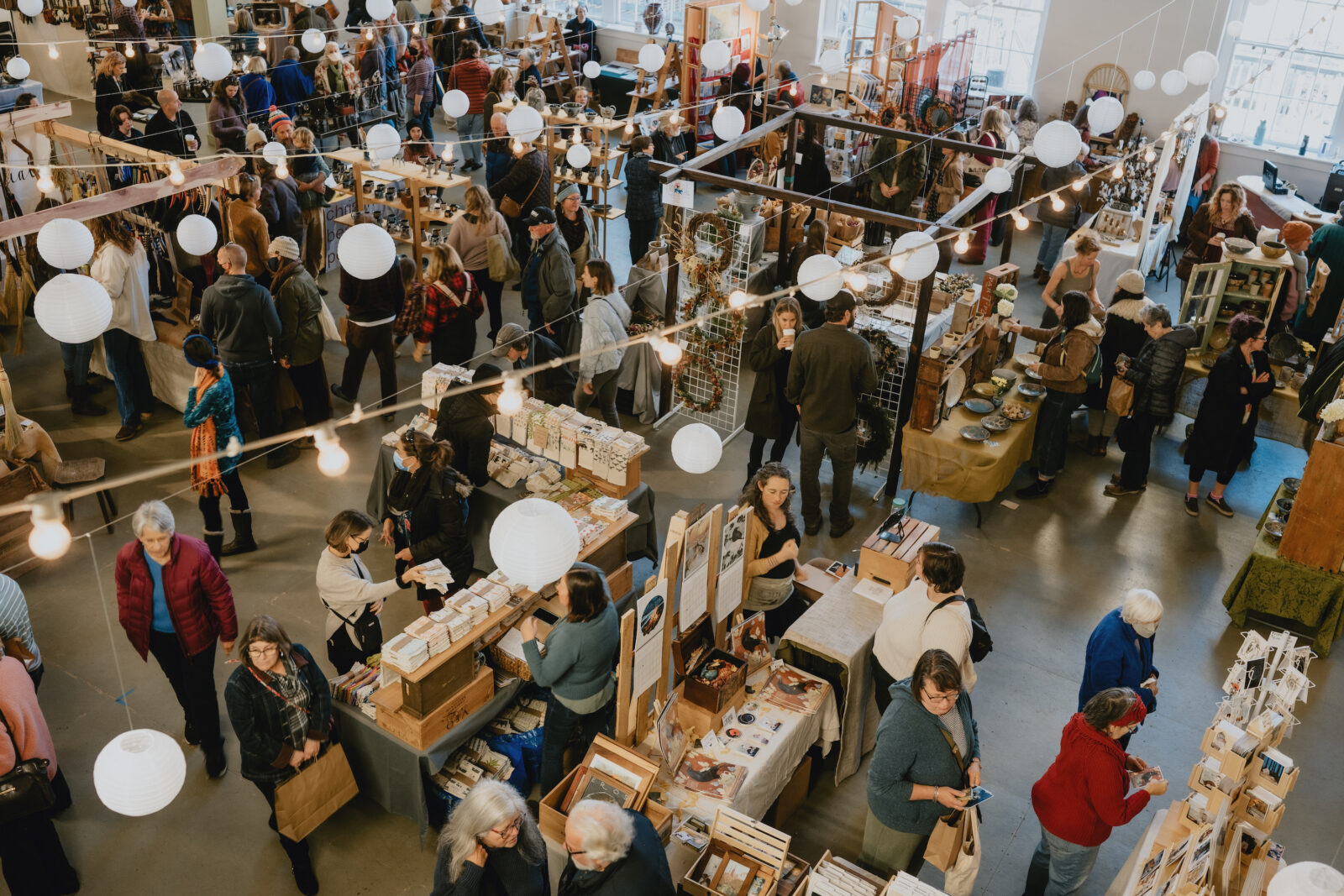The ten-acre island in the French Broad River seemed like an idyllic, creative spot. Located in a hundred-year-old former high school, Marshall High Studios hosted more than thirty artists, who stored their materials and much of their finished work there. But flooding brought on by Hurricane Helene roared in and destroyed almost all of it. In Marshall, waters crested above twenty feet.
“The thing we’re focusing on is the way people have rallied and responded,” says Josh Copus, a Marshall potter whose studio was spared but whose two businesses, the Old Marshall Jail hotel and bar and Zadies restaurant, weren’t. He describes early recovery efforts as an “amazing human story of resilience and collaboration.”
Outside Marshall High Studios, prior to the storm damage.
But he says they’re still in the early chapters. While FEMA, local governments, nonprofits, and volunteers have been addressing immediate needs—clean water, electricity, and food—artists and artisans who lost studios now have no means to make a living. And crowds would usually be flocking to Appalachia to enjoy autumn’s colors and purchase local works.
This time of year and the holidays are “when we make a disproportionate amount of our annual income,” says Jo Mosser. Along with her sister, Corina Dross, she makes illustrated calendars and cards and co-heads the Marshall Handmade Market, a curated show that was scheduled to be held in Marshall High Studios the weekend before Thanksgiving.
But hope has been arriving, from organizations large and small. Explore Asheville and partner organizations grouped together to create a shopping and support guide called Love Asheville from Afar, stating: “While the community comes together to rebuild, you can lend a helping hand from afar by shopping at these businesses’ online stores or contributing to fundraising efforts.” And to help artists’ immediate needs, Arts AVL also launched an emergency relief grant.
And Mosser and co-chair Julie Covington, a potter, announced that Odonata Farm will host the Marshall Handmade artists who can still attend that event. Supporters can donate directly to the studio restoration efforts and soon make online purchases.
“Craft and the economy are so tied together across Western North Carolina,” says e-commerce designer Corey Reid of Asheville, who’s also helping vendors recapture lost income. Reid and other designers set up Brands of WNC, an online clearinghouse of ninety-plus shops, eateries, and services, including a local artist category.
Asheville is known for its booming River Arts District, which was 80 percent destroyed by flooding. Art Play Gallery owner Kristen Edge was able to rescue the works of ten women artists whose workspace and materials were destroyed. Edge set up a site to purchase those pieces, works that “uplift the spirit and connect to the natural world,” she says.
Artists at Foundation Studios lost everything when the roaring French Broad River submerged it. Hannah Rothstein’s poster-style art focuses on climate issues and makes “the future impacts feel concrete and immediate,” she says. After she restocks her own supplies from donations directed to her, she’ll pass on funds to other artists. Jeffrey Burroughs, president of the River Arts District Artists (RADA), is designing a special collection of affordable Asheville-inspired bracelets and necklaces that will benefit RADA’s rebuilding.
East Fork pottery, a former winner of Garden & Gun’s Made in the South Awards, is one of the most recognizable Asheville companies. Founder Alex Matisse has been a vocal supporter of the arts community on Instagram, organizing a popular “seconds sale” of East Fork’s famed ceramics to continue to meet the payroll of his staff of artists and manufacturers, and then committing a portion of all sales to relief efforts.
Less impacted artists are also doing their part. Boone-based freelance photographer Jared Kreiss is donating 50 percent of proceeds from his Prints for Helene to hurricane victims through the year. Musicians, including Jason Isbell and the Mountain Goats, are sharing their music to support creatives through sales of the collaborative album Cardinals at the Window. (Find more ways musicians are supporting WNC here.)
The studio of Asheville woodcrafter Annaliese Gormley of Spoon & Hook (another former Made in the South Awards honoree) was spared, and she’s using her ample wood shavings to build compostable toilets in portable buckets. She also plans to open her space to woodworkers who lost theirs, turning her “shop into a collective,” she says. Losses have a way of snowballing, though. Gormley had recently signed a lease for her first brick-and-mortar, but her startup loan was revoked post-storm. Similarly, the hurricane spared the Mars Hill studio of Lori Collins, the owner of Sister of Mother Earth, but most events where she’d sell her wares are canceled.
The widespread loss is deep, but so is the potential to re-create, Copus says. “The art that eventually comes out of this will be powerful,” he says. Purchasing gift cards or online courses now to use in the future can provide a much-needed cash infusion. These networks of artists “are extremely resilient and creative,” Covington adds. “And those qualities are our lifeblood right now.”
The following nonprofits focus on supporting WNC’s artists and artisans:
ArtsAVL, Always Asheville Fund, Beloved Asheville, HelpMarshall.org, Watauga Arts Council fund (Boone-area artists), Brands of WNC, the River Arts District (Asheville). The Blue Ridge Natural Heritage Area supports the Blue Ridge Craft Trails and Blue Ridge Music Trails. Craft Emergency Fund Relief focuses on crafters, and the North Carolina Arts Foundation has a disaster relief fund. Chimney Rock’s shops will reopen for the holiday season at the Tryon International Equestrian Center (TIEC).

